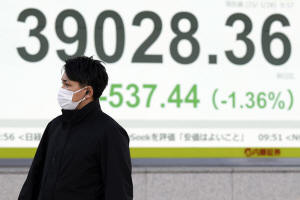Global shares are mixed after a US tech selloff as a Chinese rival joins
the global AI frenzy
 Send a link to a friend
Send a link to a friend
 [January 28, 2025] By
YURI KAGEYAMA [January 28, 2025] By
YURI KAGEYAMA
TOKYO (AP) ó Global shares were mixed in thin Lunar New Year trading on
Tuesday after Wall Streetís tech superstars tumbled as a competitor from
China raised doubts over the recent artificial-intelligence market
frenzy.
France's CAC 40 edged down 0.2% in early trading to 7,894.05, while
Germany's DAX gained 0.3% to 6,047.75. Britain's FTSE 100 rose 0.2% to
8,522.94. U.S. shares were set to trade mixed with Dow futures declining
0.2% to 44,803.00. S&P 500 futures were very slightly higher at
6,047.75.
Japan's benchmark Nikkei 225 lost 1.4% to finish at 39,016.87.
Australia's S&P/ASX 200 was little changed, inching down 0.1% to
8,399.10. Hong Kong's Hang Seng rose 0.1% to 20,225.11. Markets in South
Korea, Shanghai and other parts of the region were closed for holidays.
Among technology companies in Japan, SoftBank Group Corp. stock extended
its losses, plunging 5%. Hitachi Ltd. lost 6%, but Fujitsu and Sony
Corp. recovered. Computer chip maker Tokyo Electron sank 5.7%.

Fuji Media Holdings, rocked by a sex scandal, rose 3% after a marathon
news conference overnight by its top executives that lasted more than 10
hours, in which two of them resigned to take responsibility for the
scandal. Fuji's stock price has zigzagged in recent months amid Japanese
magazine reports about ďa problemĒ involving an anchorwoman and a
Japanese male star. He has subsequently announced his retirement.
The shock to financial markets came from China, where an AI company
named DeepSeek unveiled a large language model that can compete with
U.S. giants but at potentially a fraction of the cost.
It's unclear how much DeepSeekís announcement will ultimately shake the
economy thatís built around the AI industry, from the chip makers making
semiconductors to the utilities hoping to electrify vast data centers
gobbling up computing power.
[to top of second column] |

A person walks in front of an electronic stock board showing Japan's
Nikkei index at a securities firm Tuesday, Jan. 28, 2025, in Tokyo.
(AP Photo/Eugene Hoshiko)
 Itís a sharp turnaround for the AI
winners, which had soared in recent years on hopes that all the
investment pouring in would remake the global economy and deliver
gargantuan profits along the way. Such stellar performances also
raised criticism that their stock prices had gone too far, too fast.
A small group of seven such companies has become so dominant that
they alone accounted for more than half the S&P 500ís total return
last year, according to S&P Dow Jones Indices. They include
Alphabet, Amazon, Apple, Meta Platforms, Microsoft, Nvidia and
Tesla.
Their immense sizes give them huge sway over the S&P 500 and other
indexes that give more weight to bigger companies.
Markets are also awaiting earnings reports later this week from
Apple, Meta Platforms, Microsoft and Tesla.
In energy trading, benchmark U.S. crude added 63 cents to $73.80 a
barrel. Brent crude, the international standard, rose 73 cents to
$77.81 a barrel.
In currency trading, the U.S. dollar rose to 155.66 Japanese yen
from 154.51 yen. The euro cost $1.0431, down from $1.0493.
___
AP Business Writer Stan Choe contributed.
All contents © copyright 2025 Associated Press. All rights reserved
 |